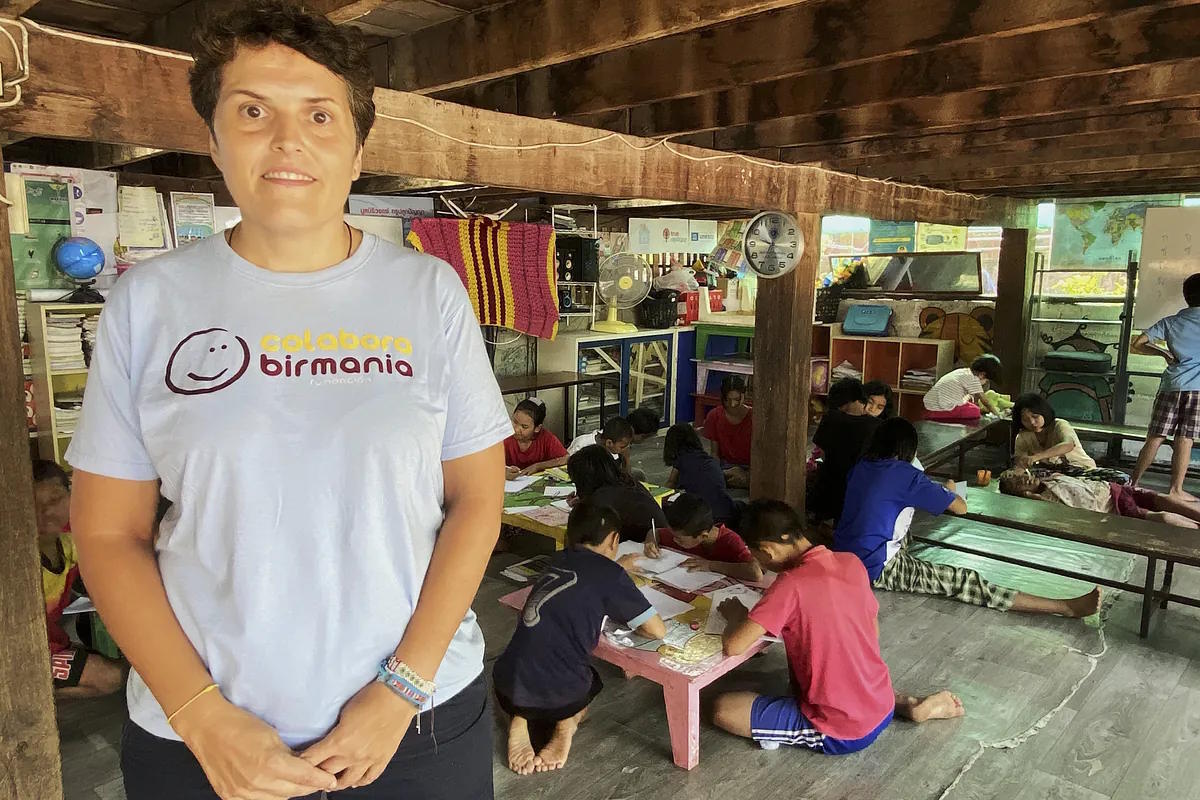Meri Viladecas is checking her phone to confirm that the aid they sent to earthquake-devastated Burma has arrived. "We bought body bags because bodies are piling up in the streets. With the extreme heat in the most affected areas, they are decomposing very quickly. We have also sent money to buy emergency kits with rice, oil, solar lanterns, personal hygiene products, and first aid items," says this 48-year-old Catalan woman.
Meri, co-founder of the Collaborate Burma Foundation, arrived 16 years ago in Mae Sot, a town nestled in the western jungle of Thailand, right on the border with Burma, to become a sort of guardian angel for refugees from a country now devastated by the around 3,000 official deaths caused by the earthquake.
"Many Burmese have always come here fleeing conflicts between ethnic armed groups and the military. But in 2021, after the military coup, there was an unexpected wave of refugees with a different profile. Before, humble families with few resources arrived in Mae Sot, and in the last four years, many politicians, actors, and artists have fled the regime. The Thais have taken advantage of this because, seeing new refugees with higher purchasing power arriving, they have raised prices for everything, starting by tripling rents."
The city of Mae Sot is just four kilometers from the border crossing over the Moei River. On the other side is the Burmese city of Myawaddy, controlled by local guerrillas. "There have been some people, like a Burmese teacher, who during these last years of civil war have dedicated themselves to rescuing orphaned children of Karen state fighters who died fighting against the army," explains the Spanish woman.
We accompany Meri to visit two orphanages where these orphans are located, managed by her organization with the support of Burmese cooperators like Pastor Thant Zin, director of a center, Heavenly Home, currently housing 82 minors. "Here we provide children with a safe place to sleep, food, and education. In some cases, they are children of parents who died fighting in the war or due to bombings. There are also stories of children who have been left alone because their parents, refugees in Mae Sot, fell into drug addiction due to the many traumas they carried," explains Thant, who has been living in Thailand for two decades. "Here we have refugees coming from central areas of Burma, the most affected by the earthquake, who have lost family members in these days," he continues.
Like every morning, the orphanage door opens to receive a solidarity van loaded with vegetables and fruits. Meanwhile, the children do their homework in a classroom next to the entrance under the supervision of a Burmese refugee teacher. It's summer vacation in Thailand, and schools, like Km 42 and Chicken School, both built thanks to Mari's organization's work, are closed.
"We are currently building a shelter and assisting in a bakery and a hotel that have labor reintegration projects for Burmese refugees," says this woman from Vic, who was in the hospitality business until she appeared as a backpacker in Thailand and got involved in humanitarian projects in Mae Sot initiated by another Spanish woman, Carmen Cebrián, who arrived here in 2008 after a cyclone that devastated Burma with over 10,000 deaths.
"After the earthquake, a new wave of refugees is coming, people who have already lost everything and will rush to cross into Thailand. Burma is a country with no chance of recovery, and the little help they will receive is what is arriving now. Then the media spotlight will fade, and everyone will forget about this country again," says Carmen over the phone, adding that they also had several development projects in central Burma until the coup isolated the country, expelling many humanitarian organizations that were based in the Buddhist nation.
Last Friday, in Mae Sot, they also felt the strong tremors of an earthquake that had its epicenter over 800 kilometers away. "We were gathered, and when everything started shaking, I jumped out the window," says Saw Aung Hto, a Burmese refugee collaborating with the Spanish foundation in managing another orphanage closer to the border. Here, at noon, children and teenagers eat quickly because they want to go to swimming classes also supervised by Meri.
During the journey to the pool, the Catalan explains that in recent months, many young Burmese, both boys and girls, have crossed into Mae Sot, fleeing the military recruitment imposed by the coup government last year. "Mae Sot, in general, is a safe place, but there are also many problems with mafias prostituting Burmese women and with drug trafficking. The other day they caught a truck full of methamphetamines coming from Burma."
Meri also emphasizes that one of the unexpected setbacks that international cooperators are facing this year is the abrupt suspension by U.S. President Donald Trump of the United States Agency for International Development (USAID), which was the main financial support for the International Rescue Committee (IRC), which provides healthcare in refugee camps.
"Suddenly, at the end of January, all aid was suspended, and many clinics closed. Then, the Thai authorities intervened to lend a hand so that at least the most severe cases being treated did not go without their treatment. But the same did not happen in other projects within the refugee camps (there are nine spread along 2,400 kilometers of the border between Thailand and Burma). Because of Trump, programs that were saving war amputees have closed."
